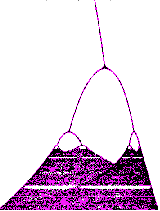|
Course Description
Most real life problems can not be solved exactly by analytical
tools. Their solution has to be approximated using numerical techniques. This
course gives a broad introduction to the field of scientific computing
with focus on problem solving using modern tools. We use throughout
the course Maple for symbolic calculations and Matlab to
develop numerical codes. The goal of the course is to get
fundamental knowledge of the underlying numerical methods in black box
solvers and thus to be able to choose and use them with confidence and
interpret the obtained results. This is the ideal course for you if
you are an applied mathematician or engineer who wants to understand
the numerical methods you are using and make an informed choice about
methods. After the course you will be able to understand problems in
your calculations and deal with them.
Their solution has to be approximated using numerical techniques. This
course gives a broad introduction to the field of scientific computing
with focus on problem solving using modern tools. We use throughout
the course Maple for symbolic calculations and Matlab to
develop numerical codes. The goal of the course is to get
fundamental knowledge of the underlying numerical methods in black box
solvers and thus to be able to choose and use them with confidence and
interpret the obtained results. This is the ideal course for you if
you are an applied mathematician or engineer who wants to understand
the numerical methods you are using and make an informed choice about
methods. After the course you will be able to understand problems in
your calculations and deal with them.
Topics
- Is error analysis and computer arithmetic in finite precision that
important ?
- Nonlinear equations: bisection, Newtons method and its variants and fixed point methods.
-
Linear systems: direct factorizations,
stationary iterative methods (Jacobi, Gauss-Seidel, SOR) and Krylov subspace
methods (Conjugate Gradient, GMRES).
-
Eigenvalue problems: Jacobi, power iterations, the QR algorithm and Lanczos.
-
Interpolation: Polynomials, splines and geometric interpolation.
-
Approximation: linear and nonlinear least squares (normal equations,
QR decomposition).
-
Differentiation: finite differences and Richardson extrapolation.
-
Quadrature: Newton Cotes rules, Romberg integration,
Gauss and adaptive quadrature.
- A first look at numerical ordinary differential equations. In depth
coverage is in the B-term.
Prerequisites
The main prerequisite for the course is that you understand the continuous
problems for which numerical methods are developed. You should know what
linear and nonlinear systems of equations are, have basic knowledge of
eigenvalue problems and be familiar with ODEs. Some programming skills
are useful as well. All the numerical analysis presented is self contained
and it is not necessary to have numerical analysis knowledge when taking
the course.
Time and Location
We will meet on Sept. 5th 2001 at 12:00 in the lounge, BH 1024 to discuss the
schedule over lunch. |
 |
Please contact me at mgander@math.mcgill.ca
if you have questions.
|
 Their solution has to be approximated using numerical techniques. This
course gives a broad introduction to the field of scientific computing
with focus on problem solving using modern tools. We use throughout
the course Maple for symbolic calculations and Matlab to
develop numerical codes. The goal of the course is to get
fundamental knowledge of the underlying numerical methods in black box
solvers and thus to be able to choose and use them with confidence and
interpret the obtained results. This is the ideal course for you if
you are an applied mathematician or engineer who wants to understand
the numerical methods you are using and make an informed choice about
methods. After the course you will be able to understand problems in
your calculations and deal with them.
Their solution has to be approximated using numerical techniques. This
course gives a broad introduction to the field of scientific computing
with focus on problem solving using modern tools. We use throughout
the course Maple for symbolic calculations and Matlab to
develop numerical codes. The goal of the course is to get
fundamental knowledge of the underlying numerical methods in black box
solvers and thus to be able to choose and use them with confidence and
interpret the obtained results. This is the ideal course for you if
you are an applied mathematician or engineer who wants to understand
the numerical methods you are using and make an informed choice about
methods. After the course you will be able to understand problems in
your calculations and deal with them.
